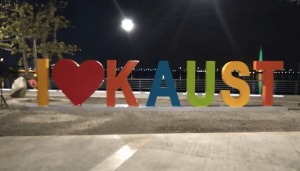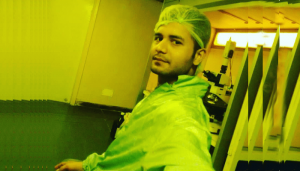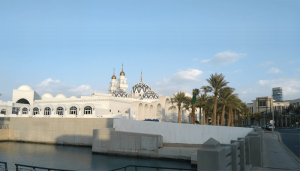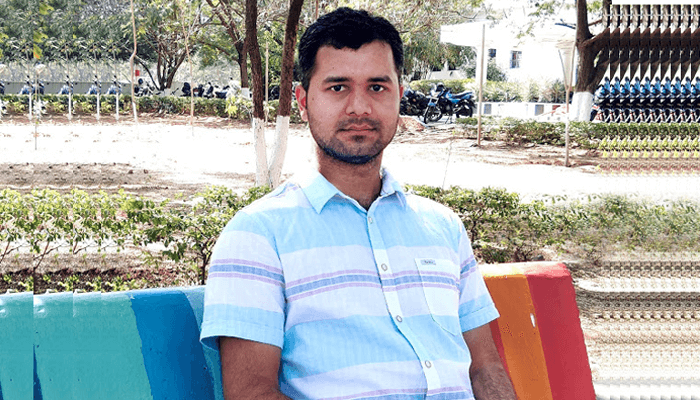What does it feel like to be studying under a Professor you idolized and whose talks on YouTube you once followed? And then again, what is it like to intern under the said Professor’s former advisor, a pioneer himself at a world-class facility – the King Abdullah University of Science and Technology (KAUST). Ask Rishabh Mishra, MS by Research student, Electronics and Communication Engineering at the Center for VLSI and Embedded Systems Technologies (CVEST).
When Rishabh Mishra got an offer of acceptance from IIITH to pursue a Masters Degree in Research, he had already paid up and was all set to begin his post-graduate degree at IIT Delhi. What turned things around was the fact that he was being interviewed by Prof. Aftab Hussain at CVEST. “Prof. Aftab is so well known in his field of Flexible Electronics. In fact, even while he was still doing his PhD, I had written to him saying I wanted to specialize in the same areas he was working on. Hence, during the 1.5 hour-long interview, I emphasized I would accept the admission offer only if he was going to be there!” says Rishabh with a laugh.
On his part, Prof. Aftab mentions that Rishabh evinced a keen interest on modelling and fabrication of semiconductor devices. Amongst other credentials such as a good GATE score, a stint with the Central Electronics Engineering Research Institute (CEERI), Pilani, where he had worked in the same area stood out in his application. Based on Prof. Aftab’s advice, upon joining IIITH, Rishabh plunged headlong into research with the aim of having at least one paper published in the first semester. “While others typically take 4 courses, I signed up for only 2 courses in the first semester. And I managed to get one paper published which was presented at the 2019 IEEE conference in IIT Hyderabad,” says Rishabh. The research paper was on elliptical shaped capacitive pressure microsensors. While a lot of studies on clamped circular, square and rectangular shaped capacitive sensors have been carried out, this sort of an elaborate theoretical modelling and simulation of elliptical shaped sensors was a first. Recognising Rishabh’s passion for semiconductor devices and witnessing his hard work, Prof. Aftab recommended him for an internship at King Abdullah University of Science and Technology (KAUST), “knowing he would do well there”.

Visiting Student Research Program
The Visiting Student Research Program (VSRP) at KAUST in Saudi Arabia is a unique one especially targeted at those who are keen on pursuing innovative research. It ranges anywhere between 3-6 months in duration and eligibility criteria of high GPAs must be met before even applying here. According to Rishabh, he underwent a rigorous selection process which involved around 4 rounds of interviews before he was selected. The VSRP is not only a fully-sponsored internship covering visa, airfare fees and health insurance but also provides interns a monthly stipend of $1000.
The description of the campus on the university website reads like a brochure of a luxurious high-end realty project. When they say, the campus is like a city within the university, with “over 45 public parks, a nine-hole golf course, over a dozen sports fields, a movie cinema, and a community beach all on the shores of the Red Sea in addition to indoor and outdoor recreation facilities where you can stay active in sports like tennis, racquetball, swimming, basketball, snorkeling, golf, rock climbing, group exercises, wind surfing, wakeboarding and squash among others,” they are not kidding. The accommodation that interns receive is rather plush too with a fully furnished apartment where laundry and housekeeping is taken care of. Rishabh attests to all the conveniences one could want – a grocery store, over 10 restaurants and retail chains such as Burger King, Domino’s Pizza and Tim Hortons catering to the diverse tastebuds of the diaspora living there. “Personally for me though, food was a bit of an issue in terms of variety since I’m a vegetarian: I was eating the same thing pretty much everyday. Otherwise, one is spoilt for choice”.
Area of Research
For the internship, Rishabh worked under Prof. Muhammad Mustafa Hussain who is the founding professor of Electrical Engineering (EE) at KAUST and a Visiting Professor of EECS, University of California, Berkeley. He is also the Principal Investigator and Principal Innovator of Futuristic Electronics Lab. Prof. Hussain’s key research area is in transformational electronics and includes innovating new applications for interactive electronics by transforming waste materials into flexible-stretchable-transparent-reconfigurable nanoelectronic systems. Incidentally, Prof. Aftab too worked under him while pursuing his PhD at KAUST. To give a glimpse of Prof. Hussain’s advances in the electronics field, Rishabh excitedly speaks of the 2020 Consumer Electronics Show Innovation Awards Ceremony in Las Vegas where a KAUST team under the professor’s guidance grabbed an award in the Tech For A Better World category. Inspired by Harvard Chemistry professor and paper device pioneer, George Whitesides, Prof. Hussain leads a research group on the design and fabrication of low-cost, lightweight, and easy-to-fabricate devices made entirely out of paper. Rishabh got the opportunity to work alongside the professor in this emerging research area with his work getting published in a journal as well as in a paper accepted for RoboSoft 2020, the acclaimed IEEE conference on Soft Robotics to be held at Yale University in April. Attributing the achievements notched up in a short span of time to his advisor, Rishabh says,”Prof. Hussain is a great manager. Besides technical knowledge that needs no further elaboration, he is meticulous and plans everything so well.”
Academic Infrastructure
Maximising his time during his internship, Rishabh worked all week, and on weekends too. Speaking of KAUST’s advanced lab infrastructure, he is all praise for the university’s facilities and support given to researchers. “I had asked for a material to test on. Since it wasn’t available, they placed an order for it. It costed about $60, but they spent $80 on shipping charges and ensured I had it the next day!” Another world-class facility that the campus boasts of is the provision of a ‘clean room’. It is a facility that is a mandatory part of specialized industrial production or specialized research (such as those required for the manufacture of integrated circuits and others) where there is a need to control the quality of the indoor environment. This is done because it directly affects the quality of products produced in it. Pointing out that in India, it is only governmental organizations like ISRO, CSIR and others that can boast of such a facility, Rishabh says,”A facility like that not only requires a huge monetary investment but also a large physical space. I was working on the Math part of my research and modelling here at IIITH. And at KAUST, I got the opportunity to fabricate my models. One can measure capacitance from 10-80. The experience is amazing!”

Looking Ahead
Back from a successful internship, Rishabh is busy completing formalities towards his Masters Degree at IIITH. With his sight set on pursuing research further, he mentions that he is contemplating options towards a PhD. “IIITH and the professors here are very well known at KAUST. I’m fortunate to have had the opportunity to be mentored by Prof. Aftab who is very chilled out. He doesn’t believe in pressurising students. Even new students of Prof. Hussain are familiar with or know of him. I was given an offer of a PhD at KAUST, but I would like to explore other places,” says the 23-year-old while signing off.


Sarita Chebbi is a compulsive early riser. Devourer of all news. Kettlebell enthusiast. Nit-picker of the written word especially when it’s not her own.


Next post